- Home
- Jacqueline Wilson
Love Lessons
Love Lessons Read online
'Deserves three cheers . . . t h e most richly enjoyable Wilson novel for years'
The Times
'As a piece of escapism, it's a glorious, book-length version of one of the
photo-stories in Jackie magazine'
Observer
'Wilson t r e a t s this subject with extraordinary emotional intelligence'
Mail on Sunday
'Jacqueline Wilson is particularly good at p u t t i n g herself inside the skin of awkward misfit characters'
Spectator
'A hard-hitting and compulsively
readable tale for teenagers'
Irish Independent
'Jacqueline Wilson at her very best'
Publishing News
'This catalogue of troubles is handled deftly, wittily and sensitively'
Irish Sunday Independent
w w w . k i d s a t r a n d o m h o u s e . c o . u k
Also available by Jacqueline Wilson Published in Corgi Pups, for beginner readers: THE DINOSAUR'S PACKED LUNCH
THE MONSTER STORY-TELLER
Published in Young Corgi, for newly confident readers: LIZZIE ZIPMOUTH
SLEEPOVERS
Available from Doubleday / Corgi Yearling Books: BAD GIRLS
THE BED & BREAKFAST STAR
BEST FRIENDS
BURIED ALIVE!
CANDYFLOSS
THE CAT MUMMY
CLEAN BREAK
CLIFFHANGER
THE DARE GAME
THE DIAMOND GIRLS
DOUBLE ACT
DOUBLE ACT (PLAY EDITION)
GLUBBSLYME
THE ILLUSTRATED MUM
THE LOTTIE PROJECT
MIDNIGHT
THE MUM-MINDER
SECRETS
THE STORY OF TRACY BEAKER
THE SUITCASE KID
VICKY ANGEL
THE WORRY WEBSITE
Collections:
THE JACQUELINE WILSON COLLECTION
includes THE STORY OF TRACY BEAKER and THE BED AND BREAKFAST STAR
JACQUELINE WILSON'S DOUBLE-DECKER
includes BAD GIRLS and DOUBLE ACT
JACQUELINE WILSON'S SUPERSTARS
includes THE SUITCASE KID and THE LOTTIE PROJECT
Available from Doubleday / Corgi books, for older readers: DUSTBIN BABY
GIRLS IN LOVE
GIRLS UNDER PRESSURE
GIRLS OUT LATE
GIRLS IN TEARS
LOLA ROSE
Join the official Jacqueline Wilson fan club at
www.jacquelinewilson.co.uk
Illustrated by Nick Sharratt
This eBook is copyright material and must not be copied, reproduced, transferred, distributed, leased, licensed or publicly performed or used in any way except as specifically permitted in writing by the publishers, as allowed under the terms and conditions under which it was purchased or as strictly permitted by applicable copyright law. Any unauthorised distribution or use of this text may be a direct infringement of the author’s and publisher’s rights and those responsible may be liable in law accordingly.
Adobe ISBN: 9781407045603
Version 1.0
www.randomhouse.co.uk
LOVE LESSONS
A CORGI BOOK 978 0 552 55352 0
First published in Great Britain by Doubleday, an imprint of Random House Children's Books Doubleday edition published 2005
Corgi edition published 2006
5 7 9 1 0 8 6 4
Copyright © Jacqueline Wilson, 2005
Illustrations copyright © Nick Sharratt, 2005
The right of Jacqueline Wilson to be identified as the author of this work has been asserted in accordance with the Copyright, Designs and Patents Act 1988.
All rights reserved. No part of this publication may be reproduced, stored in a retrieval system, or transmitted in any form or by any means, electronic, mechanical, photocopying, recording or otherwise, without the prior permission of the publishers.
Corgi Books are published by Random House Children's Books, 61–63 Uxbridge Road, London W5 5SA
a division of the Random House Group Ltd Addresses for companies within The Random House Group Limited can be found at: www.randomhouse.co.uk/offices.htm
The Random House Group Limited Reg. No. 954009
www.kidsatrandomhouse.co.uk
A CIP catalogue record for this book is available from the British Library The Random House Group Limited makes every effort to ensure that the papers used in its books are made from trees that have been legally sourced from well-managed and credibly certified forests. Our paper procurement policy can be found at:
www.randomhouse.co.uk/paper.htm
Printed in the UK by CPI Bookmarque, Croydon, CR0 4TD
For Mary, Rachel and Rebecca
I hate my dad.
I know lots of teenage girls say t h a t but they don't really mean it. Well, I don't think they do.
I don't really know any other teenage girls.
That's one of the reasons why I hate Dad. He keeps me a virtual prisoner.
I'm interrogated if I slip down the road to Krisha's Korner Shop. I'm not allowed to go into town by myself. I can't go to see any films. I can't eat in McDonald's.
Dad even fussed about me making a simple bus ride by myself to go to Miss Roberts for maths tuition. He took my sister Grace and me out of school ages ago, when I'd just gone into the Juniors and she was still at the finger-painting stage. Dad said he was going to educate us.
1
We were left to get on with it for ages, but this summer we had a home visit from a Mr Miles, who was from some kind of education authority. He wanted to know what provision Dad was making for my GCSE coursework. Dad said he didn't believe in examinations. Mr Miles smiled through Dad's tirade, obviously having heard it all before. He looked at Grace and me when Dad r a n out of steam.
'What do you want to do when you're older, Prudence and Grace?' he asked.
Grace mumbled something about working with animals. Dad won't let us have any proper pets because he says he's allergic to them. Grace h a s a lot of secret, unsatisfactory pets, like the blackbird in the garden and the toads in the compost heap and for a while she kept a wormery hidden under her bed. Grace's pets are not exactly cuddly.
'You'll certainly need to pass lots of exams if you want to be a vet,' said Mr Miles.
Dad snorted. 'You'll find our Grace has got no more brains than a donkey,' he said unkindly.
'She'll get a job in a shop somewhere and be happy enough.'
'In your bookshop?'
'She can help sell the books, but I doubt she's up to the business side of things,' said Dad. 'But Prudence can do all the cataloguing and buying and book fairs.'
'Is t h a t what you want to do, Prudence – run your father's business?' said Mr Miles.
2
I swallowed. 'I – I'd like to go to a r t college,'
I said.
Dad glared at me. 'For goodness' sake, I've told you to forget that nonsense. You don't need to go away to college to learn drawing and painting; you can do that already.'
'But I want to go, Dad.'
Dad was furious with me for arguing in front of Mr Miles, but decided not to pursue it. 'AH
right, all right, go to art college, waste three years, see for yourself,' he said. He nodded triumphantly at Mr Miles. 'I guarantee she can pass her art GCSE standing on her head.'
'I dare say,' said Mr Miles. 'But I think you'll find a r t colleges require quite a few GCSEs, plus three good A-levels. You're going to have to make more provision for your daughters' education, Mr King, especially now Prudence is fourteen.
Otherwise we might have to pursue the matter through the courts.'
'The courts!' said Mum, panicking
.
You've got no power to do any such thing,'
said Dad, hands on his hips, his chin jutting.
'You can't stop parents home-educating their children.'
'Not if they've been home-educated right from the start. But your girls have attended school in the past, so I think you'll find we have every power. However, let's hope we can avoid any unpleasant action. We all want what's best for Prudence and Grace.'
Dad seemed sure Mr Miles was bluffing, but 3
nevertheless he fixed up for me to go to this Miss Roberts for maths tuition on Wednesday afternoons.
I only went once. It was unbearable.
Miss Roberts used to teach maths at a girls'
school way back in t h e sixties. She seemed preserved in that time, still teasing her limp grey hair into a bouffant style. Her pink scalp showed through alarmingly. I kept staring at it as she bent over me, trying to explain some supposedly simple point about algebra.
I couldn't understand any of it. I wrote down random letters of the alphabet but I couldn't tease any meaning from them. I expect letters to arrange themselves into words. If I'm doing sums I need numbers – though I'm actually useless with numbers too. I can't always add up accurately. The shop takings rarely balance on a Saturday when I help out.
Miss Roberts tried hard to be patient with me.
She explained it over and over again, raising her voice and speaking very s-1-o-w-l-y. Then she switched to geometry in despair. I could draw wobbly circles with her old compass and construct reasonable squares and rectangles with my own ruler but I didn't know what any of them meant.
I paid her the twenty pounds for the tuition and she gave me a cup of tea (the milk was so old it floated in little flecks on the t a n surface) and a stale custard cream.
'Don't look so woebegone, Prudence,' she said.
4
'Your father says you're a very bright girl. I'm sure you'll catch on in no time.'
I made an extreme effort to swallow the sour milk-biscuity paste in my mouth and thanked her politely.
I didn't go back. For t h e l a s t t h r e e Wednesdays I've walked into town and spent my tuition fee. Sixty whole pounds.
I've never had so much money in my life before. Dad gives Grace and me one pound every Saturday. He behaves as if he's bestowing solid gold upon us, and even has the nerve to lecture us, telling us not to waste it on rubbish. I've always saved mine up to buy sketchpads and soft pencils and coloured crayons, bought one by one.
Grace spends hers all at once on sweets – a bar of chocolate or two, and a handful of gummy snakes. She gollops the chocolate in one go but she keeps the snakes, lining them up on the arm of the sofa, red and yellow and green like a slithery traffic light. She plays with them, giving them names and personalities, but she can't help licking them affectionately so t h a t they all get very sticky. She tries to save them till Sunday, though she sometimes can't stop herself biting off a head or two on Saturday night.
Grace isn't three or four, as you might expect.
She is eleven years old and very weird.
I know I am very weird too. I can't seem to help it. I don't know how to be a proper teenager.
I bought a couple of teenage magazines out of 5
my stolen tuition money. They were astonishing, especially the problem pages. I knew I didn't look anything like girls my own age, but I didn't realize my experiences were so different.
I've had no experiences; they've had plenty.
The girls writing to the problem pages spoke a different language and behaved as if they were from a totally different planet. They wore astonishing clothes and got up to astonishing things with their boyfriends. I read these letters feeling hot, my heart beating.
The only letters I could identify with in any way were the ones where the girls moaned about their mums and dads. They said they couldn't stick their parents. Their mums wouldn't let them have a nose stud or platform heels; their dads nagged about bad marks at school and got mad if they didn't come home till midnight.
'They should try having my mum and dad,' I muttered, as I flicked t h r o u g h t h e m by torchlight under the bedcovers.
'What?' Grace said blearily, propping herself up on one elbow. 'Are you still awake? What are you doing?'
'Just reading my book. Go back to sleep,' I said.
But Grace has bat ears. She heard the rustle of the pages. 'That's not a book, it's a magazine!
Let me see!' She leaned over from her bed. She leaned far too eagerly and fell out with a yell.
'Shut up, Grace!'
'Ouch! I've banged my elbow – and my knee!'
Grace whimpered.
6
'Ssh!'
'It hurts,' she whispered. She came scrabbling into my bed. 'Please let me see, Prue.'
'You won't tell Mum?' I hissed.
Grace sometimes h a s terrible a t t a c k s of conscience when she worries and frets about some tiny little thing she's done wrong and then suddenly blurts it all out to Mum when they're having a cuddle. Grace is far too big for cuddles now but she still wants them. She's like a large lollopy dog, desperate to be patted all the time.
I didn't waste my breath warning her not to tell Dad. Even Grace isn't t h a t mad.
'I swear,' she said. Then she whispered all the worst words she knew, swearing like a trooper.
We might live like princesses locked in a tower but you can't go down the street without hearing boys blinding away and drivers yelling. Also, very strangely, Dad sometimes swears when he's in one of his tempers, foul words frothing out of his mouth. If Mum or Grace or I ever said just one of those words he would murder us.
I showed Grace the magazines. She handled them reverently, as if they were the finest first folios, easing over the pages and smoothing them out. She looked at all the photos of teenage girls and stroked their clothes longingly. She s t a r t e d reading the problem page and t h e n snorted with shocked laughter.
'Ssh!'
'What's this girl going on about? What does she mean?'
7
'Oh, for heaven's sake, Grace, you know the facts of life,' I said, although I wasn't clear what a lot of it meant either.
I had secretly looked at several volumes of Victorian erotica which Dad bought in a book auction, presumably by mistake. I found them right at the bottom of the box, under a Norton set of the Bronte sisters. They featured a bizarre vicar, Reverend Knightly, with a large congregation of ever so lusty ladies. There were extraordinary colour plates showing the vicar cavorting in his dog collar and very little else.
I found them comical but not particularly disturbing. They were adults, figments of someone's imagination, and one hundred and fifty years old. The girls in these magazines were real.
'Oh I wish I had a boyfriend,' said Grace. 'Do you think Dad will ever let us go out with boys, Prue?'
'I don't want to go out with boys,' I said, not entirely truthfully.
For years and years I'd had a private pretend friend, an interesting and imaginative girl my own age called Jane. She started when I read the first few chapters of Jane Eyre. She stepped straight out of the pages and into my head. She no longer led her own Victorian life with her horrible aunt and cousins. She shared my life with my demented father.
J a n e was better than a real sister. She wasn't babyish and boring like Grace. We discussed books and pored over pictures and painted 8
watercolours together, and we talked endlessly about everything. Sometimes we didn't talk silently enough. I knew my lips moved and occasionally I started muttering without realizing. Grace knew I made up imaginary games inside my head and resented it.
'You're doing it!' she'd say when I muttered, giving me a nudge. 'Tell me, Prue, go on. Make it up for me.'
'Make up your own games,' I said, which was unfair, because she wasn't much good at it.
I'd started up a new and even more private pretend game recently, after Dad had t a k e n Grace and me on an educational trip to
the National Gallery in London. Dad had an old guidebook to the gallery and was all set to inform us relentlessly, but the gallery had long since rearranged all its rooms. Dad couldn't match up the text in his guidebook with any of the p a i n t i n g s and became more a n d more frustrated and irritable.
Grace barely looked at each painting, trudging with bent head, her feet dragging on the floor.
She murmured obediently whenever Dad seemed to demand a response, but that was all.
I didn't say much either. I was flying through this new magical world of religious Renaissance painting, so pink and blue and glittery gold. It was as if I'd sprouted my own beautiful set of angels' wings. I'd always painted wings plain white, but now I saw they could be shaded from the palest pearl through deep rose and purple 9
to the darkest midnight-blue tips. Some of the angels' wings were carefully co-ordinated with their gowns like matching accessories. Others had unusual, eccentric colour combinations like red and gold and black, with a white gown. One particular fashionista angel was strolling along the sandy path with a golden-haired boy about my age, holding a fish.
When we were little Dad used to read aloud to us every day from a large and unwieldy Victorian Bible. Dad had been very religious until he had a row with our vicar. He'd gently suggested to Dad t h a t home-schooling was all very well, but Grace and I needed more of a social life so we could make some friends. Dad blew his top and had no time for the vicar, his church, or the entire Christian faith after that.
He put the Bible back on the shelves as stock.
I was sorry when it sold, because I loved looking at the wonderful Doré illustrations. I remembered a lot of the Bible stories, so I knew that the boy with the fish and the angel friend was Tobias. He was dressed in colourful medieval garb, with dashing bright-red tights. I tried to imagine a modern teenage boy prancing about in scarlet stockings. Still, some boys wore their jeans skin-tight. The Tobias in the painting obligingly put on blue jeans and a white T-shirt and smiled at me.
He came home with me t h a t day as my new imaginary friend. Poor J a n e got elbowed into the background. Tobias and I read together, painted together, walked together, whispered 10
together. He spoke softly right into my ear, his cheek very nearly brushing mine.
Now I imagined him kissing me, touching me, like t h e girls and t h e i r boyfriends in the magazines. But then I imagined real boys, with their foul mouths and grabbing hands, and I shuddered.

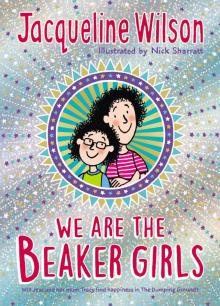 We Are the Beaker Girls
We Are the Beaker Girls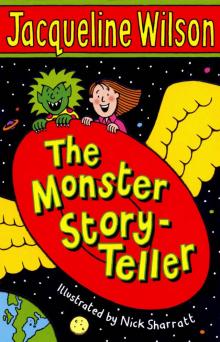 The Monster Story-Teller
The Monster Story-Teller The Worry Website
The Worry Website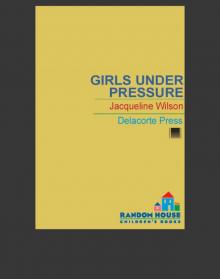 Girls Under Pressure
Girls Under Pressure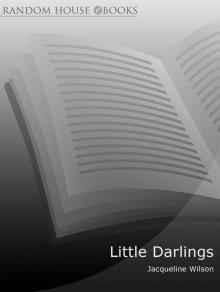 Little Darlings
Little Darlings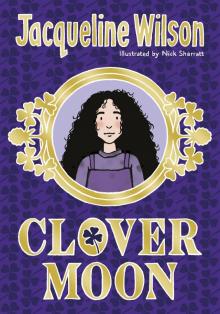 Clover Moon
Clover Moon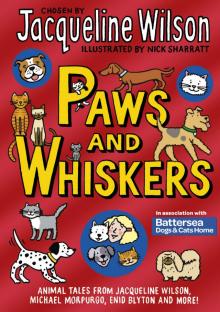 Paws and Whiskers
Paws and Whiskers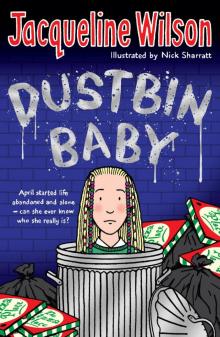 Dustbin Baby
Dustbin Baby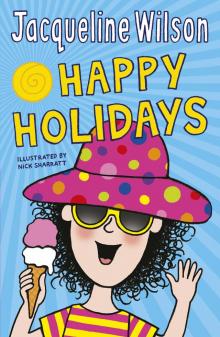 Jacqueline Wilson's Happy Holidays
Jacqueline Wilson's Happy Holidays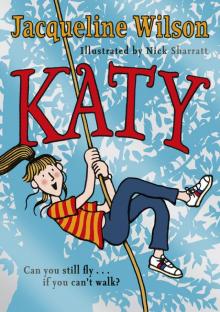 Katy
Katy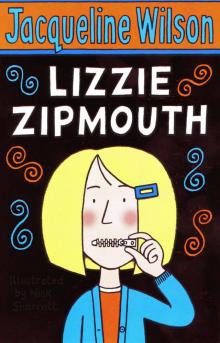 Lizzie Zipmouth
Lizzie Zipmouth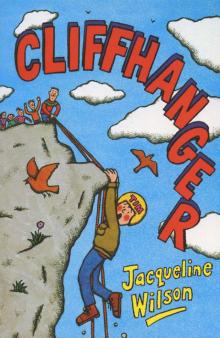 Cliffhanger
Cliffhanger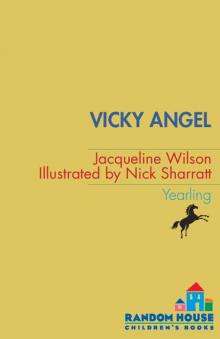 Vicky Angel
Vicky Angel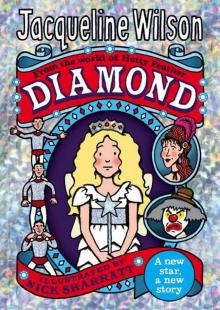 Diamond
Diamond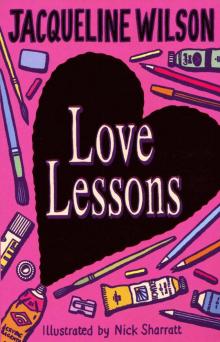 Love Lessons
Love Lessons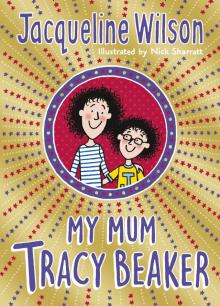 My Mum Tracy Beaker
My Mum Tracy Beaker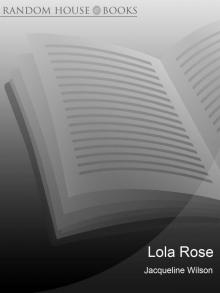 Lola Rose
Lola Rose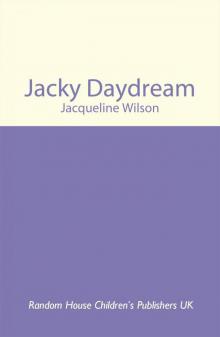 Jacky Daydream
Jacky Daydream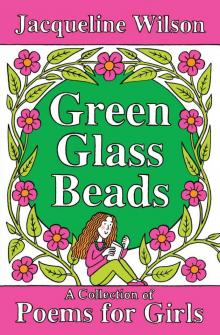 Green Glass Beads
Green Glass Beads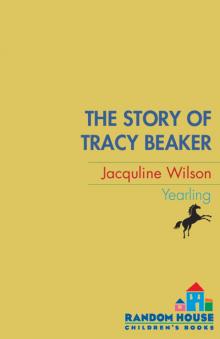 The Story of Tracy Beaker
The Story of Tracy Beaker Clean Break
Clean Break Longest Whale Song
Longest Whale Song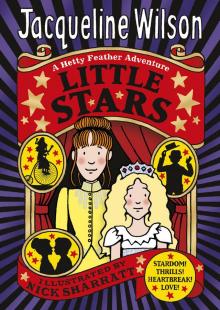 Little Stars
Little Stars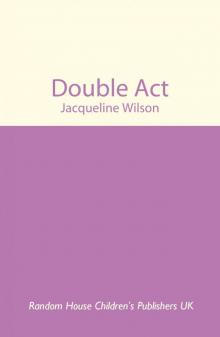 Double Act
Double Act The Suitcase Kid
The Suitcase Kid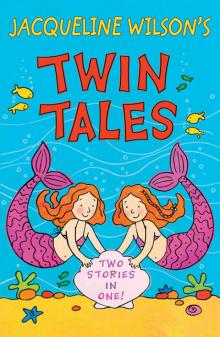 Twin Tales
Twin Tales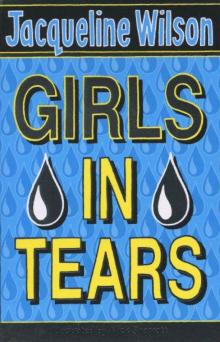 Girls in Tears
Girls in Tears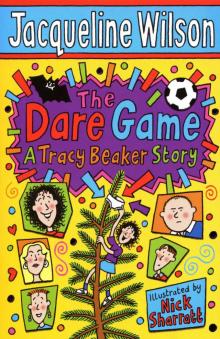 The Dare Game
The Dare Game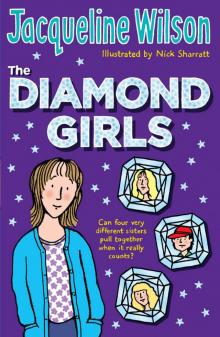 Diamond Girls
Diamond Girls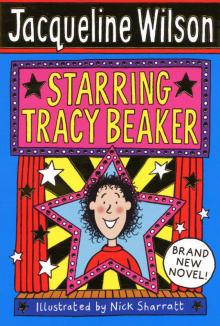 Starring Tracy Beaker
Starring Tracy Beaker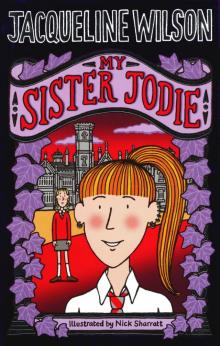 My Sister Jodie
My Sister Jodie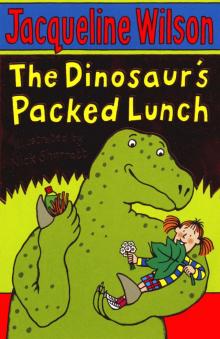 The Dinosaur's Packed Lunch
The Dinosaur's Packed Lunch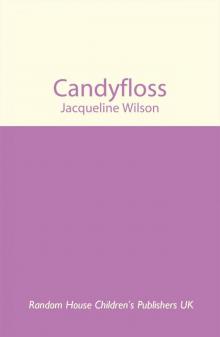 Candyfloss
Candyfloss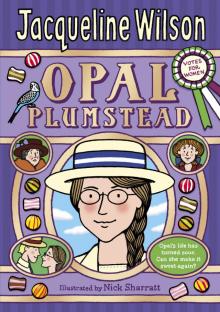 Opal Plumstead
Opal Plumstead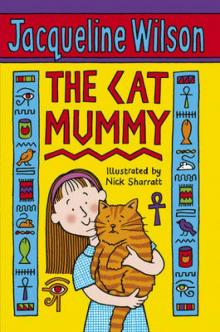 The Cat Mummy
The Cat Mummy Werepuppy and the Werepuppy on Holiday
Werepuppy and the Werepuppy on Holiday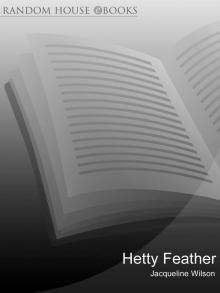 Hetty Feather
Hetty Feather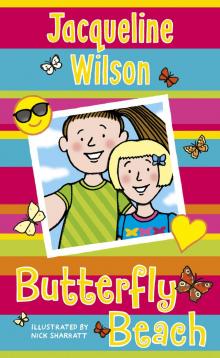 Butterfly Beach
Butterfly Beach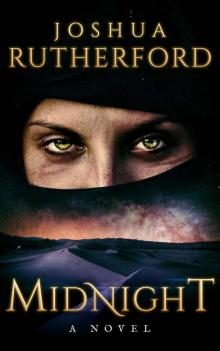 Midnight
Midnight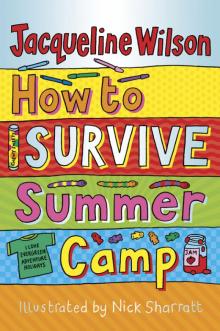 How To Survive Summer Camp (ePub)
How To Survive Summer Camp (ePub)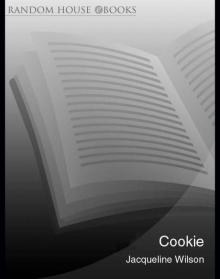 Cookie
Cookie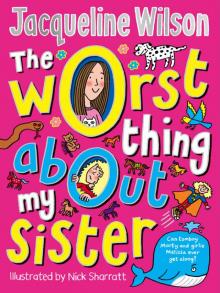 The Worst Thing About My Sister
The Worst Thing About My Sister Bad Girls
Bad Girls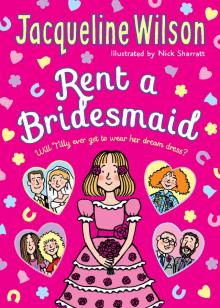 Rent a Bridesmaid
Rent a Bridesmaid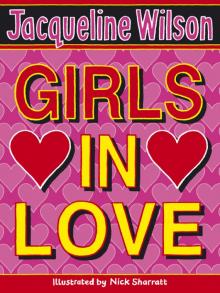 Girls in Love
Girls in Love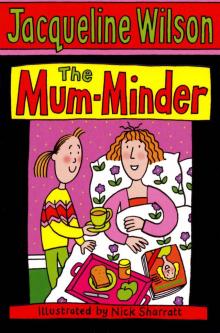 The Mum-Minder
The Mum-Minder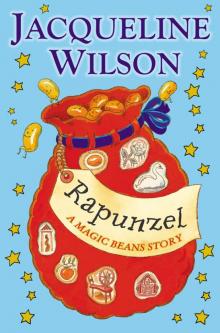 Rapunzel
Rapunzel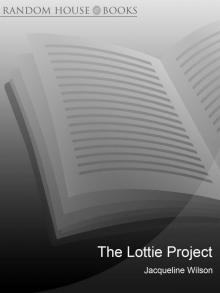 Lottie Project
Lottie Project Best Friends
Best Friends Video Rose and Mark Spark
Video Rose and Mark Spark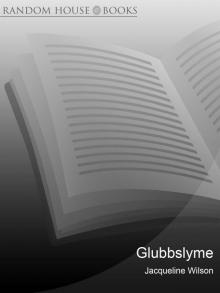 Glubbslyme
Glubbslyme Girls Out Late
Girls Out Late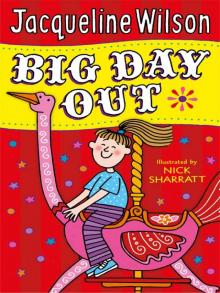 Big Day Out
Big Day Out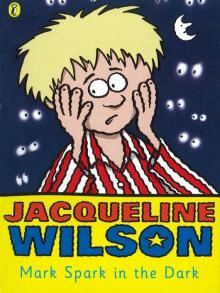 Mark Spark in the Dark
Mark Spark in the Dark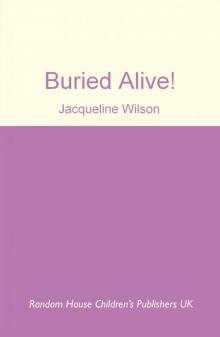 Buried Alive!
Buried Alive!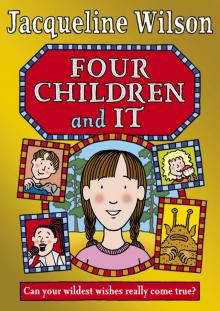 Four Children and It
Four Children and It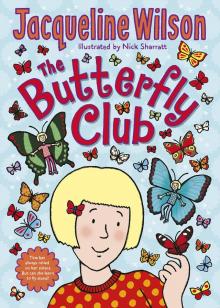 The Butterfly Club
The Butterfly Club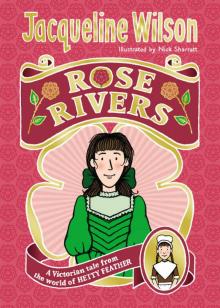 Rose Rivers
Rose Rivers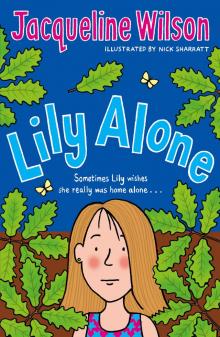 Lily Alone
Lily Alone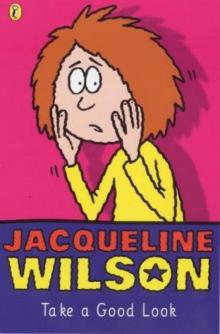 Take a Good Look
Take a Good Look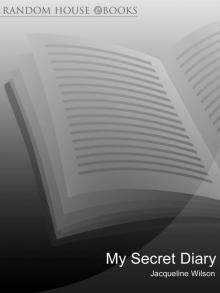 My Secret Diary
My Secret Diary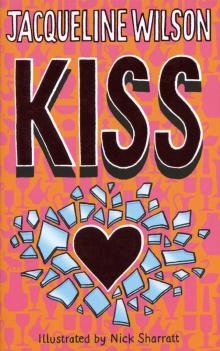 Kiss
Kiss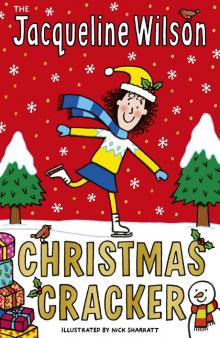 The Jacqueline Wilson Christmas Cracker
The Jacqueline Wilson Christmas Cracker The Worry Web Site
The Worry Web Site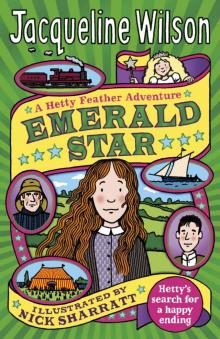 Emerald Star (Hetty Feather)
Emerald Star (Hetty Feather) The Bed and Breakfast Star
The Bed and Breakfast Star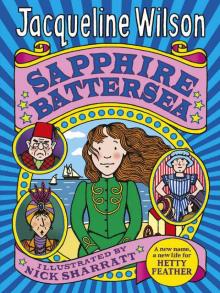 Sapphire Battersea
Sapphire Battersea Cat Mummy
Cat Mummy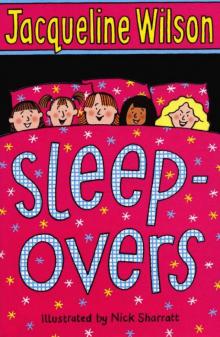 Sleepovers
Sleepovers Dare Game
Dare Game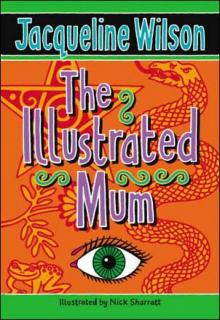 The Illustrated Mum
The Illustrated Mum Secrets
Secrets